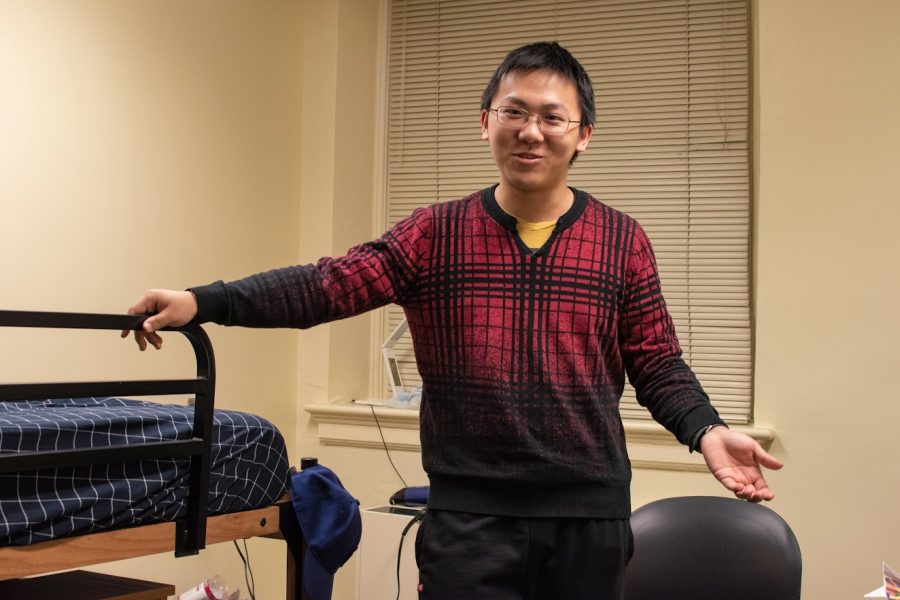Coronavirus prevents students from returning home
Yuanrui Chen, sophomore in Engineering, stands in his single dorm room located at Busey-Evans Residence Hall. Some dorms and dining halls will remain open through Continued Housing despite the University’s transition to online classes.
Mar 23, 2020
Last updated on April 9, 2020 at 06:45 p.m.
With coronavirus concerns on the rise, many international students were unable to travel home over break. Various travel bans prevented students’ returns to areas considered high-risk for the virus.
According to University Housing, about 170 students stayed in residence halls during spring break 2019, right around the yearly average. This year, students signed 258 spring break contracts.
Unless students were staying at a dorm with spring break housing included in their contracts, there were additional fees students had to pay to remain in the dorms for the week.
Shiwei Yue, sophomore in ACES, said spring break housing was not accessible enough.
Get The Daily Illini in your inbox!
Yue, an international student from China, said it’s best to avoid huge crowds and human interaction, especially in places like Chicago that have many coronavirus cases.
“It would make sense that we would want to stay on campus,” Yue said. “But because you have to pay extra for everything when it’s inconvenient on campus, there is no good reason for people to stay when going home is a way better option.”
Yuanrui Chen, sophomore in Engineering, said he didn’t stay on campus over spring break due to the additional housing expense.
“I tried paid housing freshman year fall break, and I would say it’s relatively expensive and moving stuff to FAR is no fun. For the next two breaks, I stayed either in my friend’s house or traveled around,” Chen said.
Chelsea Hamilton, senior assistant director for communications and marketing for University Housing, said the cost for students staying in the dorms was $40 per night.
“We still have an operation. We still have services and utilities and various things. [We have] student employees and professional employees that are there to keep the buildings open. That fee helps to cover that overhead,” Hamilton said.
The University’s transition to online classes will not change anything for University Housing. Some dorms and dining halls will remain open to students through Continued Housing.
Hamilton said that University Housing has been planning for action since the coronavirus began.
“While I can’t be transparent with sharing all of the specifics of these plans, it’s important for our residents to know that we do have plans in place,” Hamilton said. “We have different levels or trigger marks, where we will start to implement different strategies and best practices.”
Hamilton said that it is essential for the campus community to know that for some students, University Housing is truly their one home.
“We have some students who are international students or out of state students, who cannot physically travel back right now,” Hamilton said.
As the coronavirus situation changes daily, the University will continue to update students on any new information regarding the University’s operation.
“It’s important for residents to know that we are living in a situation that’s creating uncertainty and concern,” Hamilton said. “For us to be as strategic as we possibly can, it’s important that we stick to the facts, and we share the facts, and we’re not just spreading assumptions or rumors.”






